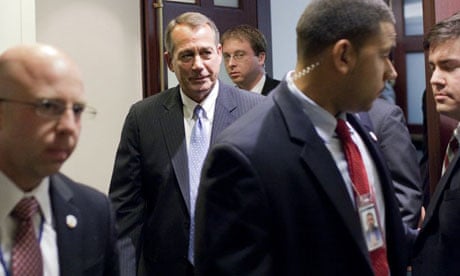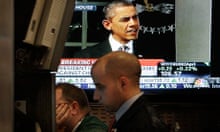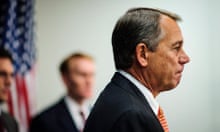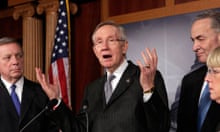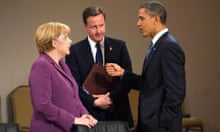The standoff between the White House and Congress over the 'fiscal cliff' turned into a full-blown crisis on Thursday night when Republican House Speaker John Boehner was publicly humiliated, unable to command enough support to secure passage of his own bill.
Boehner had planned to push through the Republican-dominated House a bill that would have seen tax rises curbed for those earning $1m a year or less.
But he was forced to withdraw it in the face of a Republican revolt, with Tea Party-backed members unable to stomach the prospect of voting for any tax rise, even for those earning $1m or more.
Only hours earlier, his team had been confidently predicting it had enough Republican votes to get the bill through. But as the time for the vote neared, it became clear he did not have sufficient votes and called an emergency meeting. Boehner was unable to win over the rebels. Afterwards he announced passage of the bill had been abandoned.
"The House did not take up the tax measure today because it did not have sufficient support from our members to pass," Boehner said.
The White House press secretary, Jay Carney, responding to the House debacle, issued a statement saying: "The president's main priority is to ensure that taxes don't go up on 98% of Americans and 97% of small businesses in just a few short days.
"The president will work with Congress to get this done and we are hopeful that we will be able to find a bipartisan solution quickly."
The problem is that Obama no longer has a partner on the Republican side to reach a deal with, with Boehner having lost support.
The onus will now be on the Republican leader in the Senate, Mitch McConnell, to come forward to try to stitch up a deal as he has so often in the past, though he shown no appetite for getting involved up until now.
Earlier in the week, a deal had appeared close, with Boehner and Barack Obama thrashing out the details face-to-face and on the phone. But that effort has now ground to a halt.
If Boehner cannot control his own Republican party, it is difficult to see how a deal is going to be reached before 1 January.
Without an agreement by 1 January, every taxpayer in America will face a rise. Automatic cuts in federal spending will also kick in.
The bill Boehner had been proposing to pass, the so-called 'Plan B', was primarily tactical, with no chance of ever becoming legislation. The Democratic-controlled Senate would have killed it and, on the remote chance of it making it out of Congress, Obama said he would veto it.
The main aim of the 'Plan B' bill was to provide some cover for the Republicans so they would not get all of the blame if taxes go up.
The Republicans and Obama are at odds over the scale of taxation and spending cuts. Obama wants tax rises to start at $400,000, not the Republicans' proposed $1m. Obama has offered $800bn in spending cuts but the Republicans are seeking $1.2tn.
Both the House and the Senate now look set to head off on holiday on Friday with no deal in place.
Having failed to get even a symbolic bill through, Boehner handed over responsibility to resolving the crisis to the Democrats, both Obama and the Senate leader Harry Reid.
"Now it is up to the president to work with senator Reid on legislation to avert the fiscal cliff," Boehner said.
The problem is that if the Senate passes a bill that would see taxes rise for those earning $400,000 and above, the Republican-controlled House will kill it.
The standoff is almost a rerun of a similar one in spring and summer 2011 when Boehner and Obama almost reached a deal on resolving the debt crisis but it had to be abandoned after Boehner faced a revolt.
Much of the Republican opposition is down to ideological distaste for voting for any tax rise. If the country goes over the fiscal cliff on 1 January , as seems increasingly likely, and every taxpayer sees a rise, there might then be a way out.
Ideological Republicans could then vote for a Democratic bill to reverse most of the tax rises, at least for those earning $400,000 a year or less.
Boehner faces re-election as Speaker next year but this debacle leaves a question over whether he commands enough loyalty in the Republican ranks any longer to make that a foregone conclusion.
